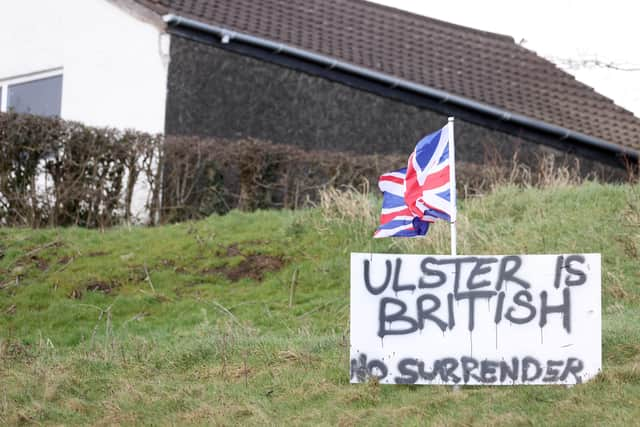Alex Kane: Alienation has beeen unionism’s default setting for a century


(See link to Peter Robinson’s article below:)
What we understand as ‘Ulster’ unionism has its roots in the original Home Rule Crisis of 1886: and for the last 135 years unionism has lived in constant fear of two things: betrayal and the loss of its British identity.
The partition of 1921 (another border it never wanted) left it trapped between a perceived enemy to the south and a sea to the east.
Advertisement
Hide AdAdvertisement
Hide Ad

Its own parliament (without whose approval Northern Ireland couldn’t create a united Ireland) provided a comfort blanket of sorts, yet it also represented a political/administrative/constitutional distancing between NI and the rest of the UK: a distancing that, inevitably, nudged NI into a ‘place apart’ status.
And being viewed as a place apart is not helpful if your ideology and identity is built around maintaining the geographical/constitutional integrity of the UK.
A century ago Edward Carson addressed the House of Lords: “What a fool I was. I was only a puppet, and so was Ulster, and so was Ireland, in the political game that was to get the Conservative Party into power ... of all the men in my experience that I think are the most loathsome it is those who will sell their friends for the purpose of conciliating their enemies ...”
Ironically – and in NI’s centenary year – the same thing has just happened to the DUP (and broader unionism), with the ERG and Boris Johnson using the DUP’s votes for their own purposes and then dumping the NI Protocol on them.
Advertisement
Hide AdAdvertisement
Hide AdRegrettably it was that original fear of betrayal and loss of identity which pushed unionism into ‘what we have we hold’ insularity between 1921 and 1972. Everyone was a potential enemy. Every Catholic was a united Irelander (and probably an IRA sympathiser).
Any unionist (and there were a few) who dared to speak of compromise and reaching out was dismissed and ostracised as a Lundy. And in the late 1960s the demand for equal rights and equality of citizenship (the very principles upon which the UK was supposedly cemented) was treated by the majority of unionists as an assault upon the Stormont citadel.
The problem for unionism at that point was the discovery that it didn’t actually have any friends where it mattered. It had been left to manage its own affairs for the previous 50 years and, even though Ulster Unionist MPs had taken the Conservative whip from 1921, the Conservative Party did not rally to its side.
There was no backbench rebellion when prime minister Edward Heath prorogued Stormont on March 28, 1972. Indeed, there was barely a peep of protest from anyone at Westminster or in the national and international media.
Advertisement
Hide AdAdvertisement
Hide AdAnd that continuing lack of support was evident for most of the next 50 years, fuelling the unionist fear of alienation, betrayal, abandonment and loss of identity.
Worse, every time unionists attempted to articulate and explain their fears they were mostly written off as the usual old ‘negativity and serial whinging from dinosaurs and bigots’. That seemingly serial inability to win friends and influence people has long puzzled me: yet it remains the case and continues to do unionism enormous damage.
Meanwhile, the IRA campaign carried on; the back-channels between the IRA and government remained open; successive British governments continued to trot out policies like the Anglo-Irish Agreement and Downing Street Declaration (‘... no selfish strategic or economic interest ... in Northern Ireland”); and unionists continued to believe they were being deliberately shoved to the ‘window-ledge of the Union’ in preparation for the final push.
So, what’s the difference between that lengthy back catalogue of what unionism usually describes as ‘betrayal’ and the NI Protocol? Aren’t the complaints just the same sort of thing unionists have said about almost every twist and turn in the political process since March 1972?
Advertisement
Hide AdAdvertisement
Hide AdThe same sort of ‘wolf, wolf’ response that London, Dublin, Brussels and Washington are used to hearing every few years?
No. This time it’s different. While all the previous crises (and maybe one of the faults of unionism is our fondness for viewing everything as a crisis) have resulted in ‘the sky’s falling in’ concerns, the sky never actually fell in. A very strong argument could still be advanced that NI remained, to all intents and purposes, an integral part of the UK.
But how do you advance that argument when a very specific, very obvious constitutional demarcation line now exists between NI and GB; and when NI remains part of the EU single market and customs union, while GB doesn’t?
How does a unionist advance the case for the Union now that the ‘place apart’ has been converted into a granny flat? How is unionist identity protected when, to quote the title of one of my favourite comedy programmes, unionism is in real danger of being reduced to ‘resident alien’ status?
Advertisement
Hide AdAdvertisement
Hide AdThe ‘alienation’ which most of unionism acknowledges as a problem is – and always has been – a two-way process. We allowed the distance between ourselves and GB to grow between 1921-72. And we haven’t been very good at improving it since then.
How the protocol dilemma can be resolved is not, as yet, clear: but it must be resolved. That requires a four-way dialogue between London, Brussels, Dublin and Belfast.
It’s what unionism needs to be prioritising right now.
• Peter Robinson: Unionists are more alienated than I have seen at any time in my 50 years in politics
——— ———
A message from the Editor:
Advertisement
Hide AdAdvertisement
Hide AdThank you for reading this story on our website. While I have your attention, I also have an important request to make of you.
With the coronavirus lockdown having a major impact on many of our advertisers — and consequently the revenue we receive — we are more reliant than ever on you taking out a digital subscription.
Subscribe to newsletter.co.uk and enjoy unlimited access to the best Northern Ireland and UK news and information online and on our app. With a digital subscription, you can read more than 5 articles, see fewer ads, enjoy faster load times, and get access to exclusive newsletters and content. Visit https://www.newsletter.co.uk/subscriptions now to sign up.
Our journalism costs money and we rely on advertising, print and digital revenues to help to support them. By supporting us, we are able to support you in providing trusted, fact-checked content for this website.
Alistair Bushe
Editor